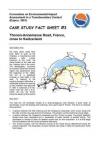Search
Displaying Results 1541 - 1560 of 2813
- English
The study presents trends and concerns related to economic aspects of gender equality in four Central Asian countries (Kazakhstan, Kyrgyzstan, Tajikistan and Uzbekistan) and analyses policy responses as reflected by National Development Strategies and activities of international organizations.
- English
This is the second EPR of Kazakhstan published by UNECE. The report takes stock of the progress made by Kazakhstan in the management of its environment since the country was first reviewed in 2000. It assesses the implementation of the recommendations in the first review (Annex I). It also
- English
This document was prepared for UNECE within the framework of EECCA component of the EUWI National Policy Dialogue on IWRM in ArmeniaDownload in English
- Français
- Français
- English
- English
- English
- English
In collaboration with national and international statistical experts, the UNECE Statistical Division publishes recommendations, guidelines and resources on a range of statistical topics.View publications: by topic
- English
This study identifies the role and benefits of spatial planning, the particular challenges vis-à-vis spatial planning that face countries in transition, its key principles, the division of roles and responsibilities, the main stages in the process of developing spatial plans, and priority actions
- English
- English
This annual publication presents statistics and brief studies on transport along with tables on energy consumption for transport. Data covers Europe, Canada and the United States. This is a trilingual publication in English, French and Russian.2008 edition
- English
Economic Globalization - A Challenge for Official Statistics (1.1 MB) (2008) Proceedings of the Joint EFTA/UNECE/SSCU SeminarEvaluating Efficiency of Statistical Data editing
- English
At advanced stages of transition to a market economy, entrepreneurship and enterprise development come to the forefront of the development agenda. However, in countries with economies in transition (or “emerging market economies”), both new and operational companies often face formidable













